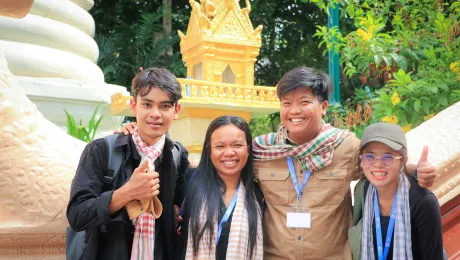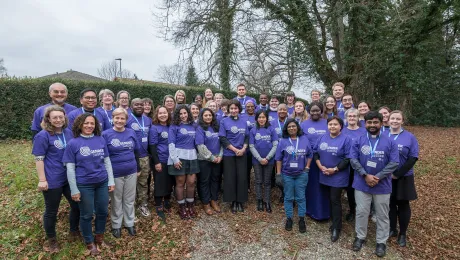
Youth leader and gender justice advocate Phiona Uwase. Photo: LWF/A. Hillert
Youth leader Phiona Uwase reflects on the role of theology to advance gender justice in her church and community
Theology, as the study of religious and divine truths, has long influenced how societies perceive God, people, and society, tackling profound existential issues of ethics, meaning, and purpose. Theological reflection also fuels my own commitment to advancing gender justice within my church, contributing to a more inclusive, equitable and compassionate space for all.
Gender justice aims to address structural disparities in opportunity, privilege, and power between the sexes. As people of faith, we are carried by the grace of God and so we are called to transform unjust systems and relationships. We are thus prompted to consider theology from a viewpoint that supports the rights, dignity, and worth of every individual, regardless of gender, at the nexus of these two fields—where faith and the struggle for equality meet.
Reinterpreting Scripture for Gender Justice
The creation story in Genesis 1:27 is often cited by theologians, scholars, researchers, and gender justice advocates. “So God created humans in God’s own image, in the image of God they were created; male and female they were created.” This suggests that all people are equally created in God’s image, countering interpretations that promote male superiority.
Furthermore, biblical figures like Deborah, who served as a judge and leader of Israel (Judges 4), and Mary Magdalene, a key witness to Jesus’ resurrection (John 20:18), challenge patriarchal readings of Scripture that limit women’s roles. These stories highlight women’s leadership and spiritual authority in early religious contexts.
Traditional Christian theology often uses male imagery for God, such as "Father" or "King." However, the Bible also provides feminine metaphors for God, suggesting a more expansive view. Isaiah 66:13 compares God’s comfort to that of a mother: “As a mother comforts her child, so will I comfort you.” This broader understanding of divine imagery both helps challenge gendered hierarchies within religious thought and gives us the gift of broadening our own understanding of and relationship to God.
Many denominations are now rethinking leadership structures, with more women being ordained as priests and pastors. This shift challenges centuries-old practices that barred women from spiritual leadership roles in the church.
Gender Justice as a Moral Imperative
The call for gender justice is not simply a social or political agenda; it is a theological and moral imperative. If we believe that every person is made in the image of God, we must also believe that any system or belief that oppresses individuals based on their gender is contrary to God’s will. As we continue to explore theology in the context of gender justice, we must remain open to rethinking our traditions and interpretations. We must also take active steps within our faith communities to promote equality, amplify women’s voices, and dismantle harmful gender norms.
As faith communities continue to grapple with issues of equality and inclusion, the dialogue between theology and gender justice offers a path forward—one that seeks to dismantle systems of oppression, restore balance, and create a world where everyone can flourish. For religious believers committed to the values of love, compassion, and justice, this evolving understanding of gender is a powerful reminder that the pursuit of divine truth must always include the pursuit of human equality.
In my Rwandan context, these reflections hold a particular significance. Rwanda is a country that has made strides towards gender equality, yet traditional norms and patriarchal structures still shape many aspects of life, including faith communities. Reflecting on gender justice through a theological lens not only challenges these norms, but also aligns with the broader goals of unity, dignity and healing that the country seeks.
This post is part of a new LWF Youth monthly theological series called “Global Faith Unfiltered.” It features reflections from young theologians on the most pressing issues and topics across their communities, from a perspective of the priorities highlighted at the 2023 LWF Assembly.


